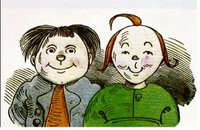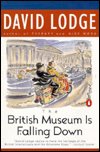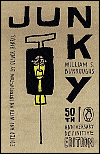Future Mythologies
A Textual Journey with Maxwell Von BismarckMonday, March 27, 2006
What is Deutschland’s Alice like? Both poems take as their target the moral children’s story. The idea that a story to be read to a child should teach the child a lesson and prepare her to be a good adult. But where Carroll and Tenniel take that idea and trounce over it, Busch explodes it. It becomes larger than life. Larger than (previous) fiction. Was Busch the first to recognize the comic anarchy of Struwwelpeter? No, but he turned it into something magical as opposed to simply creepy or perhaps a little disturbingly funny.
Max and Moritz, bless their black little hearts, are Deutschland’s tricksters, primordial and archetypal. Spirits of mischief, conspiring with each other, giggling with delight at what they work. When Carl Jung wrote about the Trickster in his books on archetypes, was he thinking of Max or Moritz? He was Swiss, so perhaps not.
Tuesday, March 07, 2006
Monday, March 06, 2006

Okay, enough of the bad reviews. Time to talk about something wonderful:
I read Max and Moritz for the first time this weekend, and it's already become a part of my inner consciousness. I've been seeing Max and Moritz inside my head my whole life, and I haven't known what it was until now. Sure, I had heard of it, and I've always appreciated the idea and recognized its importance in the history of literature, but now I believe in it. I feel like I should be making some kind of commentary on the psychosocial meaning of the book and its pervasiveness, but all I feel like doing is gushing about it. I'm going to have to write fully about this tomorrow.

Bird by Bird was assigned reading for a writing class I took, though no sections were ever assigned and few people read the book. I had totally forgotten I had bought it until I was packing up my dorm supplies at the end of the semester. Recently I broke it out and began it to see if I could learn anything from Lamott. While there may be a lot of information in here that could help someone, it's by far the worst book on the craft of writing I've ever started (I gave up around chapter three after spending 2 weeks trying to get through). Lamott wastes no time in telling us that writers drink heavily, smoke marijuana, and are unsuitable for any other jobs. Oh, they also listen to jazz music. The lifestyle is so important to Lamott that you can't help but believe that's the main reason she's in this business.
If you want a book on the craft of writing, please read anything besides this one. Julia Cameron is especially insightful; I'll write more about her works later.
Friday, February 03, 2006

Okay, I've written about a few books I've read recently I've liked, so I think it's time for some negativity. The critic has an obligation to write both favorably and unfavorably, so here goes:
This is a book that's been sitting next to my reading chair for about a month half-finished. I can't remember what convinced me to read it originally, but probably that it is a humorous, postmodern book that takes place in a library. I love humor writing, postmodernism, and I especially love libraries, so it sounded essential. It's a short book and very easy to read, but about 100 pages in (halfway) I couldn't get it up to read any more. Actually, I think the first time I put it down, I never picked it up again.
The elements of postmodern pastiche (Kafka, Joyce, others I didn't recognize) are pale and sickly parodies, and the subject matter (doctoral research, birth control) tends to be esoteric and dated. But the main problem, of course, is that it just isn't entertaining. Lodge's other books might be fine, but his first attempt to write humor is laughably weak.
Monday, January 30, 2006

I've read my fair share of those colorful little Intro books. The ones that tackle a vast and indefinable philosophy in a fun, easy-to-read way. There are several lines, such as Introducing... and A Very Short Introduction to, which have many very helpful and enjoyable volumes. However, I haven't found an introduction to Buddhism as clear as this one - and it's very refreshing. Nhat Hanh writes with compassion, understanding, and considerable authority. By about 100 pages in, I was ready to convert. What he gives us is not an expansive overview of Buddhism in all its varieties, but more like a crash course in the one that he teaches. A wonderful book.
Friday, January 27, 2006

With the ridiculously stupid furor over Frey's book A Million Little Pieces spilling over the media, it seems timely that I just recently read Burroughs' Junky for the first time. I haven't read Frey, but Junk was such a great read that the question of authenticity in the work didn't enter my mind until a week after I had finished it. But if you've read any of Burroughs' corpus you probably know that the author's responsibility toward the reader to represent reality, honesty, and truth are three entirely different things.
Junk is Burroughs first book, and is half a world apart from Naked Lunch and the Nova trilogy. The sci-fi elements are almost completely absent, and the dystopian paranoia is much more subtle. It works as a great introduction, as you can see how lucid he can be when he wants to, and every once in a while he delves into the surreal workshop and begins to forge the materials of his (and our) literary future.
Thursday, January 26, 2006
Touching From a Distance is perhaps the key primary source for one of the 20th century's richest, most complex bodies of music (namely Joy Division, but perhaps Manchester post-punk in general). Also, along with Morley's Nothing, it's one of the most honest and revealing biographies of the English punk era. Nothing sits on my chairside shelf waiting to be read, so I can't compare the two yet.
Touching, in addition to adding to the psychological insight behind Joy Division's music, also, perhaps for the first time, tells the story of an astoundingly successful rock band from a wife's point of view and manages to irreversibly color the legacy (I believe Cynthia Lennon released a book, but it is lost in an ocean of Beatles-related writings). Ian Curtis does not come across as a very nice person, but it doesn't make me like him any less as he was clearly a very disturbed person living in a society that had no idea how to help him. I would recommend it whole-heartedly, but when it comes to the Manchester music scene, I'm fairly easy to please (I loved the much-hated 24 Hour Party People, for instance).

Book Reviews!
are apparently a new feature at this blog, which I can never seem to get the energy to contribute toward. First is Ajax, published by Cambridge University Press. The translation is clear and enjoyable, leaning toward the accuracy end of the poetry/accuracy spectrum. Little information is given about the translator, I suppose we are supposed to envision all of their Greek drama as one collective work.
I didn't think I would enjoy it, as the only Sophocles I had read in high school and at Emerson College was Antigone, by far the most well known of all Greek tragedy. I read the Young translation, or tried to, but was bored to sleep by what appeared to me as completely archaic and totally devoid of the catharsis its famous for.
Of course, I was just a stupid 19 year old. I now like (though not love) Antigone, and Ajax is a similar story, except operating on a more famous myth (Trojan War as opposed to Theban cycle). The play is worth it alone in that it provides Ajax's own tale, which is a little bonus between the death of Achilles and the fall of Troy. There are pportunities here to stage great scenes of insanity and torture, which is a major reason why we like tragedies so much. Productions of Ajax seem to be scarce, though.
Archives
May 2003 June 2003 July 2003 August 2003 September 2003 October 2003 November 2003 December 2003 January 2004 February 2004 March 2004 April 2004 May 2004 August 2004 October 2004 November 2004 December 2004 January 2005 February 2005 June 2005 September 2005 January 2006 February 2006 March 2006